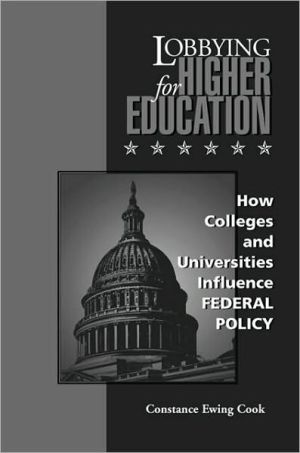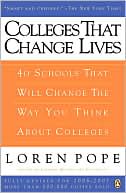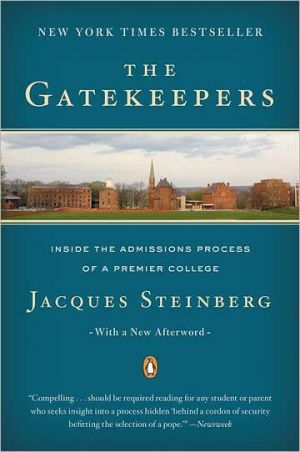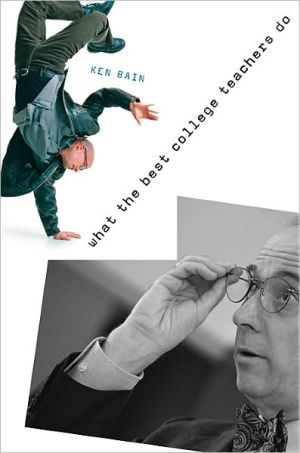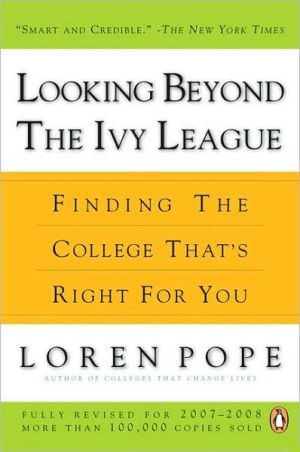Lobbying For Higher Education
Historically, many faculty and administrators in higher education have regarded themselves as above the fray--part of the national interest, not a special interest--and considered lobbying a dirty business unworthy of their lofty enterprise. Now that academia no longer enjoys all the respect and good will that federal policy makers once afforded it, that attitude has changed. The Republican sweep of the 1994 Congressional elections served as a wake-up call for the higher education community....
Search in google:
Historically, many faculty and administrators in higher education have regarded themselves as above the fray—part of the national interest, not a special interest—and considered lobbying a dirty business unworthy of their lofty enterprise. Now that academia no longer enjoys all the respect and good will that federal policy makers once afforded it, that attitude has changed. The Republican sweep of the 1994 Congressional elections served as a wake-up call for the higher education community. In response, it made a spirited effort to gain attention for its own policy preferences.Lobbying for Higher Education is about how the major higher education associations and the constituent American colleges and universities try to influence federal policy, especially congressional policy. In clear prose Cook explains how the higher education community organizes itself in Washington, how it lobbies, and how its major interest groups are perceived both by their own members and by public officials. The book focuses on the crucial development in 1995-1996 of a new lobbying paradigm, which included the greater use of campus-based resources and ad hoc coalitions. The most engrossing part of its story is higher education's creative response to the policy turmoil and disruption of the status quo that resulted from the shift in congressional party control.The author, Constance Cook, uses sources unique to this project: over 1,500 survey responses from college and university presidents (a 62% return rate) and nearly 150 interviews with institutional and association leaders. Fortuitously, the 1994 electoral upheaval provided her with an opportunity to capture, analyze, and interpret the responses of her subjects in a period of unusually sweeping change.Lobbying for Higher Education is a timely book with an interesting and important story at its core. Library Journal The first in a new series from Vanderbilt, this volume details how the world of higher education attempts to get its fair share of the federal education dollar. Cook (education, Univ. of Michigan) explains the workings of the Big Sixa group of major associations that serve as the principal voices of higher education. Higher education once distanced itself from lobbying, feeling it was somewhat above begging for money. But times have changed, and colleges and universities now realize how crucial it is to make their presence known in Washington. Cook describes how the Big Six work, often amid controversies and conflicts, and highlights how the makeup of the 104th Congress elected in 1994 created new problems for education lobbyists. Cook's work is very detailed and well written and will be of interest to those involved in higher education. For academic and larger public libraries.Terry A. Christner, Hutchinson P.L., KS
List of Figures and TablesForewordPrefaceAcknowledgments1Higher Education Policies and Representation32A History of Association Lobbying up to 1990193Challenges in the Early 1990s344The Arrival of the 104th Congress535Coordination of the Higher Education Community646Organizational Maintenance in the Big Six Associations887Federal Relations Differences among Institutions1158The Choice of Lobbying Techniques1389Success in the 104th Congress17310A New Understanding of Higher Education Lobbying18311An Overview for College and University Presidents198App. ASurvey Sent to College and University Presidents205App. BComparison of Survey Respondents and Overall Population of Colleges and Universities in the United States210Notes211Bibliography220Interviewees231Index238
\ From the Publisher\ Everyone engaged in any way in the Washington battles of higher education will want this map of the terrain, locating as it does both the institutional combatants and the issues. Through a convincing and fascinating analysis of recent history, Professor Cook also provides clear, concise, balanced, and compelling judgments that will be of critical importance to everyone touched by federal higher education policy.\ --Sheldon Hackney, former president of Tulane University and the University of Pennsylvania, and former chairman of NEH\ An important antidote to the increasingly cynical view of Washington and a must-read for current and aspiring college presidents, deans, and other administrative and student leaders. Cook details the remarkable story of how the higher education community, believing in the rightness of their cause, drastically changed their modus operandi and prevailed in the most serious battle in decades over federal support of higher education.\ --Nan Shelby Wells, Director of Government Affairs, Princeton University\ Lobbying for Higher Education is the finest study we have of coalition formation among Washington lobbies and the best book we have on the interest group politics surrounding policymaking for colleges and universities.\ --Jeffrey M. Berry, author of The Interest Group Society and Lobbying for the People\ A superior book, well grounded in the relevant literature, that offers consistently balanced, informed, and perceptive judgments.\ --Hugh Davis Graham, author of The Rise of American Research Universities\ Outstanding. Cook's use and interpretation of interview and survey data are superb. The book will command the attention of all of the major stakeholders in the relationship between higher education and the federal government.\ --Harland G. Bloland, author of Associations in Action: The Washington Higher Education Community\ \ \ \ \ \ Library JournalThe first in a new series from Vanderbilt, this volume details how the world of higher education attempts to get its fair share of the federal education dollar. Cook (education, Univ. of Michigan) explains the workings of the Big Sixa group of major associations that serve as the principal voices of higher education. Higher education once distanced itself from lobbying, feeling it was somewhat above begging for money. But times have changed, and colleges and universities now realize how crucial it is to make their presence known in Washington. Cook describes how the Big Six work, often amid controversies and conflicts, and highlights how the makeup of the 104th Congress elected in 1994 created new problems for education lobbyists. Cook's work is very detailed and well written and will be of interest to those involved in higher education. For academic and larger public libraries.Terry A. Christner, Hutchinson P.L., KS\ \
